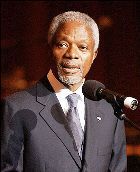Annan expects Sudan response soon on peacekeepers
Nov 21, 2006 (GENEVA) — U.N. Secretary-General Kofi Annan said Tuesday he expected Sudan’s government to respond within two days on outstanding issues of an agreement signed last week that would allow U.N. peacekeepers into Darfur.
 Annan said the deal, announced Thursday in Addis Ababa, Ethiopia, could be described as “a turning point” in the 3-year conflict, which has left an estimated 200,000 people dead and forced 2.5 million to flee their homes.
Annan said the deal, announced Thursday in Addis Ababa, Ethiopia, could be described as “a turning point” in the 3-year conflict, which has left an estimated 200,000 people dead and forced 2.5 million to flee their homes.
The U.N. peacekeepers — which Sudan long opposed allowing into Darfur, saying that would violate its sovereignty — would form a mixed force with the African Union, which now has 7,000 peacekeeping troops in the region but loses its mandate at the end of the year.
Annan said the new force should include 17,000 soldiers and 3,000 police officers. He said Sudan has accepted the agreement but still wanted to consult on the size of the force and how its commander would be appointed.
Sudan also wanted to discuss the role of a new special representative to act for both the United Nations and African Union.
“Those were the only outstanding issues they were to consult on and come back as quickly as possible,” Annan told reporters at the U.N.’s European headquarters in Geneva. “We do expect them to come with an answer by today, or, latest, tomorrow.”
In the meantime, Annan said the global body would press ahead with implementation of the deal so that that a peacekeeping vacuum at the end of the year is avoided.
On Monday, President Omar al-Bashir’s government hailed the agreement but said serious differences remained over these questions.
While it was the first official word by Khartoum of its acceptance of the deal, there were signs the government might still resist deployment of a U.N. force to bring an end to the continuing bloodshed.
A Cabinet statement spoke only of U.N. “assistance” to the African Union force, and depicted the agreement as a defeat for a U.N. Security Council resolution that called for a peacekeeping force fully under U.N. control.
Al-Bashir was scheduled to visit Libya on Tuesday for a meeting on Darfur hosted by Libyan leader Moammar Gadhafi. Delegations are expected from Sudan, Chad and Egypt.
“I suspect they will come up with some definitive answer,” Annan said. “I’m quite hopeful.”
The United States has said it is prepared to move to a “Plan B” for dealing with Sudan if no agreement is reached by January 1 but has yet to specify what that would entail.
“We need to put a time limit on where this is going,” presidential envoy Andrew Natsios said Monday, declining to describe what consequences Sudan would face if the deadline was not met. “Making threats is not a wise thing to do.”
Under the agreement, the joint U.N.-AU statement said, troops for the force would be drawn from African countries to the extent that was possible, while “backstopping and command and control structures will be provided by the U.N.”
After years of low-level clashes over water and land in the vast, arid Darfur region, rebels from ethnic African tribes took up arms against Sudan’s Arab-dominated central government in 2003.
Khartoum is accused of unleashing janjaweed militiamen, who are blamed for many of the atrocities in the conflict that has destabilized a wide region that includes parts of neighboring Chad and the Central African Republic.
A peace agreement signed by Sudan’s government and one rebel group in May has been ignored, and the violence has escalated in recent months.
